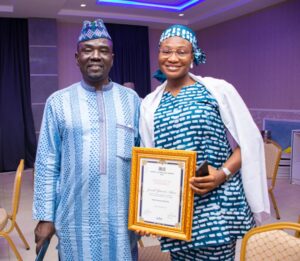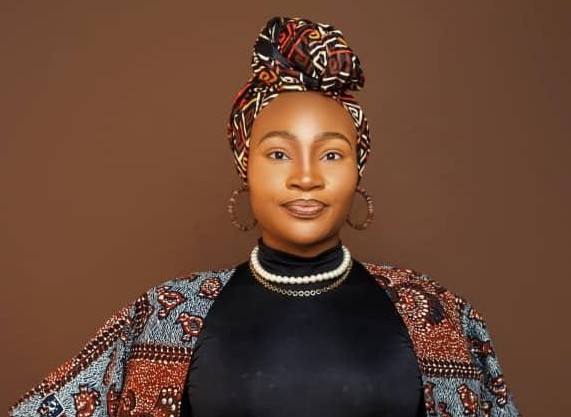Zainab Yetunde Adam, a young multi-media award-winning investigative journalist is a freelance journalist working on Gender, Conflict, Humanitarian and development stories in Borno State.
She has also worked in a couple of media organizations including the Nigeria Television Authority (NTA) Maiduguri, being an On-Air Personality, News Producer and Caster at Al-Ansar Radio and Television and a News Reporter and Caster at Kanem FM 97.7 UNIMAID Radio.
In December 2022 she won the following awards with a single story: Investigative Reporter of the year at Youths’ Digest Campus Journalism Awards, Investigative Campus Journalists of the year at Alfred Opubor Next Gen Campus Reporter Awards, Best Health Reporting at Alfred Opubor Next Gen Campus Reporter Awards and First Runner Best Gender Story at Alfred Opubor Next Gen Campus Reporter Awards.
The freelance journalist and broadcaster spoke with Peace Oladipo on conflict reporting and other issues.

You won different awards with a story on health. Can you share your experience doing this story?
This story means a lot to me. Initially, I was naive about what Open Contract Reporting is, but luckily I was shortlisted for the Fellowship by the International Centre for Investigative Reporting (ICiR) in 2022. I was trained alongside other fellows by seasoned journalists in the country.
I was mentored by an experienced Editor who never got tired of the back-and-forth I went through with my copy. Through this story, I was able to unravel Health Care challenges while tracking budgetary allocation that was misappropriated at the expense of the masses.
Humanitarian, ICIR and Premium Times are some of the platforms on which your reports have been published. When and how did you start journalism?
I started in my school UNIMAID, Mass Communication Department precisely. An undergraduate student is expected to go on Internship twice. So I first did my Internship at Nigerian Television Authority (NTA) Maiduguri in 2018. From there, I started nourishing my passion to be a Newscaster and with the first Campus Journalism Conflict Reporting Training by Centre for Journalism Innovation and Development (CJID) on 19th August- 23rd August 2019, I realized I can do more with the pen beyond News casting.
I was encouraged by some of my lecturers, notably Dr Abdulmutalib Ado Abubakar to be writing articles and he edited them for me. He and other staff in my department supported me to do my first video documentary titled “The need” in April 2019. The Documentary was for an entry at African International Documentary Festival Foundation (AFIDFF). I didn’t emerge as a finalist but the documentary became an eye-opener on the prerequisite of Documentary production.
Similarly, The Coordinator of the Campus Journalists in my school, Dr Sharafa Dauda has been a supportive mentor to date. Apart from being my project supervisor, he gives me story ideas sometimes and encourages me to do Human angle and investigative stories.
More so, the Campus Reporter Network was there for me just like other students in the country. As Campus Reporters, CJID Mentors trained and gave us Internship opportunities at Newsrooms of our choice. I did my third Internship at Al-Ansar Radio courtesy of CJID. I was paid N30,000 for a period of four months (September 2021 – January 2022). I was honoured with an Award of Loyalty and Dedication by the Barcelona Supporters Club North East Region, got an appointment as their Publicity Officer, and got a Barcelona Jersey among other gifts on the show I presented at the Radio station from my fans. As a result of my engagement there, Al-Ansar gave me a job as a casual staff member but I left in October 2022 when I began losing interest in the sports segment to fully settle for TV and print journalism.
What does it mean to report conflict-related issues from a state like Borno?
Well, Borno is a home of peace and I believe with time normalcy will return to the state. Reporting conflict is a sensitive beat everywhere not only in Borno. However, as a journalist, I do consider the risk involved in every story before embarking on it. I was taught to always carry out a risk assessment and not just to go to a location in the name of wanting to be the first to break the story and not to escalate the conflict with the report.
Secondly, you might encounter challenges talking to authorities such as the Military to balance your story. But CJID trained me to always give every side to a story a voice to be heard and I do that to date except where the parties refused to respond and then I do indicate that party’s stance.
Also, reporting conflict can be traumatic at times especially when you see victims dying helplessly and when you see malnourished or ill children groaning in pain or bomb blasts and straight bullets here and there. I will just say it is never easy but the word “impossible” is not in my dictionary. You will always find a way out; patience is key in whatever situation.
In journalism, have you ever experienced marginalization because of your gender?
Yes but I later realized that women can make a difference so far as they are doing the right thing. So, I don’t mind such things now.
As a graduate of mass communication, what are the essential issues that you feel the lecturers are failing to inculcate in the students so they can thrive in journalism?
Well, in my school, students are subjected to a lot of practicals ranging from Radio, TV, Blogging, and Newspaper and Magazine production. What we don’t have but are trying to establish is an umbrella body for every Campus journalist and we look forward to registering the union after the Gubernatorial and State Assembly Elections once school resumes this year.
What is the ultimate goal you wish to achieve in Journalism?
To use the pen to continue advocating for Sustainable Development Goals (SDGs) and make a positive impact(s) in people’s lives.
Can you rate female journalists and comment on their performance in Nigeria?
Their performances are encouraging but we need to improve and get the very best in all we do. Being a homemaker shouldn’t be a deterrence to female journalists’ goals.
Nigeria is blessed with great writers and journalists, many of whom are digging deep and exposing ills. Do you think investigative journalism is making an impact in Nigeria?
Yes, it is making an impact. And I would like to call on citizen journalists and content creators masquerading on Twitter or any other social media to please work in line with the ethics of the journalism profession or use morals as a guiding principle. This way, journalism will thrive for the better.
There is this stereotype about women in Islam. They are expected to be reserved for feminine or domestic duties. Some even believe that a good Muslim woman must be veiled and never indulge in a career. What’s your view on this?
Well, Islam preaches modesty. Islam also encourages women to guard their chastity while practising their job or going about with their daily activities. Khadija, wife of Prophet Muhammad (S.A.W) was a businesswoman who transacted in line with the tenets of Islam. Allah knows best.
Superwoman, how do you combine broadcasting and print journalism?
I must say it is never easy and suffice it to say that nothing good comes easy. However, if you are familiar with your organization’s house style and you plan your activities although there might be impromptu assignments you have to attend to, it is manageable. More so, passion is my driving force.
If you were to be in the midst of 2 million teenage girls, What advice would you give them?
They should always have a niche in life and be the best in everything they do.
Who are your mentors in journalism? And why do you choose them?
Dr Sharafa Dauda, Ajibola Amzat, Busola Ajibola, Abdulkareem Haruna, Taiwo Obe, Olajide Adelana, and Dr Abdulmutalib Ado Abubakar. I choose them because they always stand by and support the truth.
Here is a scenario for you. I once nearly landed in a problem due to a story I did with a senior reporter in January 2022. The first thing Mr Ajibola Amzat asked me was “Zainab did you lie?” And I said no and lucky enough we have the evidence with us.

